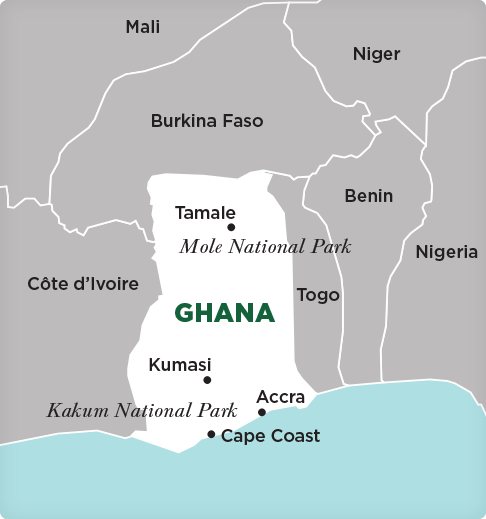Credits
16
Prerequisites
None
Language of Study
Asante Twi
Courses taught in
English
Dates
Aug 30 – Dec 12
Program Countries
Ghana
Program Base
Accra
Critical Global Issue of Study
Identity & Human Resilience
Development & Inequality

Experience West Africa through immersion in Ghanaian cities, which challenge stereotypes of Africa and position the continent as a global economic, political, and cultural force.
16
None
Asante Twi
English
Aug 30 – Dec 12
Ghana
Accra
Identity & Human Resilience
Development & Inequality
From Ghana, you’ll gain a new perspective on Africa’s cosmopolitanism, one that complicates and defies Eurocentric representations that emphasize narratives of deprivation and backwardness. The central motif undergirding this program is Sankofa, a Ghanaian concept that encourages a strong engagement with the past in order to ensure informed and sustained progress into the future. You’ll also be introduced to the intricacies of hiplife music, media houses, and institutions across the country that highlight Ghana’s position in a hyper-globalized world.
None


You’ll visit different suburbs of Accra and learn to navigate the city like a local. Spend time in various upper-, middle-, and lower-income areas to see how class structure is changing. At Madina market, you’ll explore the evolving status of women and gender relations and notice what these reveal about a changing political economy and social dynamics in Ghana. You’ll also visit museums, art galleries, private start-ups like Soronko Solutions and mPedigree, and think-tanks such as the Center for Democratic Development.
Famed for its craft villages, Kumasi, in central Ghana, is the country’s second-largest city and is rich in Ashanti culture. During this week-long excursion you’ll visit the Manhyia Royal Palace, the seat of the Ashanti King, which houses a museum. You will also explore Kejetia, a sprawling, vibrant, open-air market, and the new Kumasi mall, a modern complement to the traditional Ghanaian market. You will engage with young artists who imagine Ghana through contemporary lenses. A visit to Incas Diagnositcs shows how digital technology is being used in locally relevant ways. A stop at Adanwomase offers an in-depth look at kente-weaving, and you will visit Asamankese, a cocoa-growing village with an eye to ecotourism.
At Cape Coast, once the capital of the Gold Coast, and the nearby town of Elmina, you will visit sites where enslaved people were held before being shipped to the Americas during the Trans-Atlantic slave trade. The area is an important focal point of pan-African history.
At the end of the excursion, you’ll visit Kakum National Park known for its breathtaking Canopy Walkway suspended more than 1,000 feet above the ground. Walk along the treetops to spot endangered mammals such as forest elephants, bongo antelopes, and the Diana monkey.
You will spend time in the Western Region of Ghana as you visit the Shama Fort, the Takoradi Mall, and Nzulezo, a village built on stilts on the water.
Large quantities of oil were found off the coast of this industrial and commercial city in 2007, spurring an economic boom. You’ll see how multinational companies like General Electric have boosted the local economy. You’ll visit a GE plant and speak to workers about the role expatriates play in reshaping Ghana’s socioeconomic fabric. Finally, you will spend time at the UN High Commission for Refugees to learn how Ghana hosts refugees from Ivory Coast, Sudan, Syria, and Liberia.
In Tamale, a historic city in the northern region, you will gain insights into Ghana’s changing class structure. One of the fastest-growing cities in West Africa, it is a culturally diverse blend of tradition and modernity. You will go to Larabanga and see a mosque that was built in 1421. In addition, visit NGOs such as norsaaac, which deals in gender advocacy and ending child marriages, to understand the role NGOs play in empowering marginalized communities. During this excursion, you will again visit Mole National Park, Ghana’s largest wildlife refuge.
The trip to the north of Ghana is also steeped in history, specifically related to the Trans-Atlantic Slave Trade. After a trip to Paga, home of tame crocodiles, you will visit the Pikworo Slave Camp and the Salaga slave market.
In Ada, near the coast of Ghana, you will visit Nkyinkyim, an open-air museum that celebrates the richness of African history. Walk through and interact with the creative installations accompanied by the curator.
In the beautiful Volta Region in eastern Ghana, you will climb Afajato, the highest peak in the country, and cool down at the Wli waterfalls, which is one of the highest waterfalls in West Africa. You will also visit a monkey sanctuary where you can feed the monkeys.
Please note that SIT will make every effort to maintain its programs as described. To respond to emergent situations, however, SIT may have to change or cancel programs.
Upon successful completion of the program, students will be able to:
The following syllabi are representative of this program. Because courses develop and change over time to take advantage of dynamic learning opportunities, actual course content will vary from term to term.
The syllabi can be useful for students, faculty, and study abroad offices in assessing credit transfer. Read more about credit transfer.
Sankofa: Cultural Legacies and Afro-Futures – syllabus
(AFRS3000 / 3 credits)
This seminar revolves around a central question: how are visions of the present and future of Africa crafted through a thoughtful interrogation of its past? The central motif that undergirds this seminar is Sankofa, a Ghanaian concept that encourages a strong engagement with the past in order to ensure informed and sustained progress into the future. Sankofa is often associated with the proverb, “Se wo were fi na wosankofa a yenkyi” (“It is not wrong to go back for that which you have forgotten.”). After framing an African epistemological relation to Africa’s presents and futures in light of the concept of Sankofa (module 1), we will revisit our painful past in order to create a framework for understanding the cultural, socio-political, and economic particularities of Africa, Africans, and Africans from the diaspora (module 2). Students will, subsequently, rethink the political particularities of Ghana and the continent in light of the concept of Sankofa (module 3). In the concluding module, we will use the concept of Sankofa to engage with one of the most timely frameworks for thinking of Africa today: Afrofuturism.
Urban Cultures, Social Innovation, and the Afro-Chic – syllabus
(AFRS3500 / 3 credits)
This course involves an immersion into Ghanaian cities as sites for not only countering existing stereotypes of Africa, but also for positioning the continent as a global economic, political, and cultural force. Students will be introduced to the intricacies of hiplife, media houses, and institutions across the country, which highlight the position of Ghana in a hyper-globalized world. Through these aspects of urban culture, students will understand how the reshaping of continent narratives by local actors has implications for the global flow of information. This seminar brings together concepts connected to hiplife, food, and the Afro-Chic to engage critically with Ghanaian urban cultures.
Asante Twi – syllabus
(TWII1003-3503 / 3 credits)
This course is designed to help students obtain oral proficiency and enable them to adapt to the host culture. Language instruction begins during orientation and quickly introduces students to basic vocabulary and sentence structure and encourages students to immediately begin using Asante Twi. Students will develop strong listening, comprehension, and communication skills and learn use the language confidently and effectively in everyday situations as well as within the context of the demands of the Independent Study Project or internship.
Research Methods and Ethics – syllabus
(ANTH3500 / 3 credits)
Drawing upon myriad in-country experiences, cultural encounters, homestay conversations, and community observations, this research methods and ethics course is primarily designed as a field-based course complemented by classroom lectures, assigned readings, and discussions facilitated by the academic director. The course relies on SIT’s in-country professional network and academic and socio-cultural resources to structure assignments and field activities through which students practice and hone their skills in gathering, managing, and analyzing primary data. Students learn qualitative and quantitative approaches of gathering, managing, and analyzing data from primary sources. The course emphasizes ethical considerations that guide primary data collection and culturally appropriate ways of building rapport, initiating purposeful dialogue, forming constructive relationships with organizations and/or individuals, recording and analyzing primary data, and writing a scholarly academic report. By the end of the course, students will produce an Independent Study Project or internship proposal.
In addition to taking the above courses, students will also need to enroll in one of the following two courses:
Internship and Seminar
Internship and Seminar – syllabus
(ITRN4000 / 4 credits)
This course consists of a four-week internship with a national or international organization that is working in the broad area of social change in Ghana. SIT will use its extensive network to place students in internship organizations, or students may petition SIT for approval of internship placements that they find on their own initiative. Ultimately, each student takes responsibility for making optimal use of resources available at the organization and for being proactive in engaging with local experts to achieve their internship objectives. An internship seminar, conducted via weekly two-hour reflection and assessment sessions are held with the academic director or internship coordinator.
Sample internships:
OR
Independent Study Project
Independent Study Project – syllabus
(ISPR3000 / 4 credits)
This four-week independent study project, scheduled in the final portion of the program, gives students a unique opportunity to study in depth a key aspect of the program’s themes in Ghana. The ISP draws upon the knowledge and various skills gained from the thematic, language, and research methods and ethics seminars.
Sample ISP topics:



SIT Study Abroad is committed to ensuring that international education is within reach for all students. We believe in the transformative power of immersive, intercultural experiences and are dedicated to supporting students in their educational journey.
See Full Breakdown
A critical step in preparing for your study abroad program is planning how you will maintain your health and wellbeing. Please review the following information carefully and contact [email protected] with any questions or concerns.
View Information